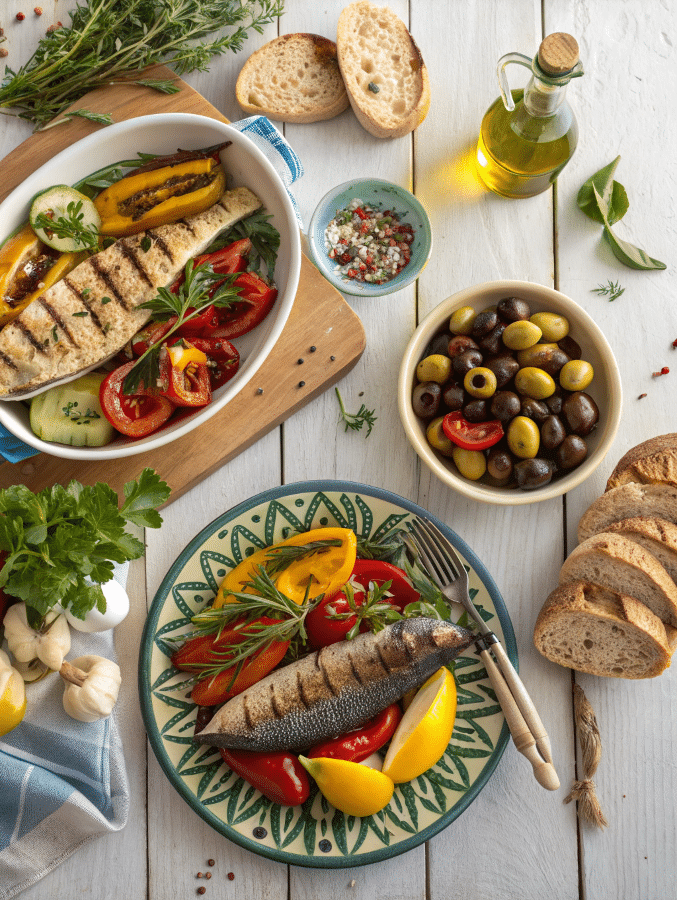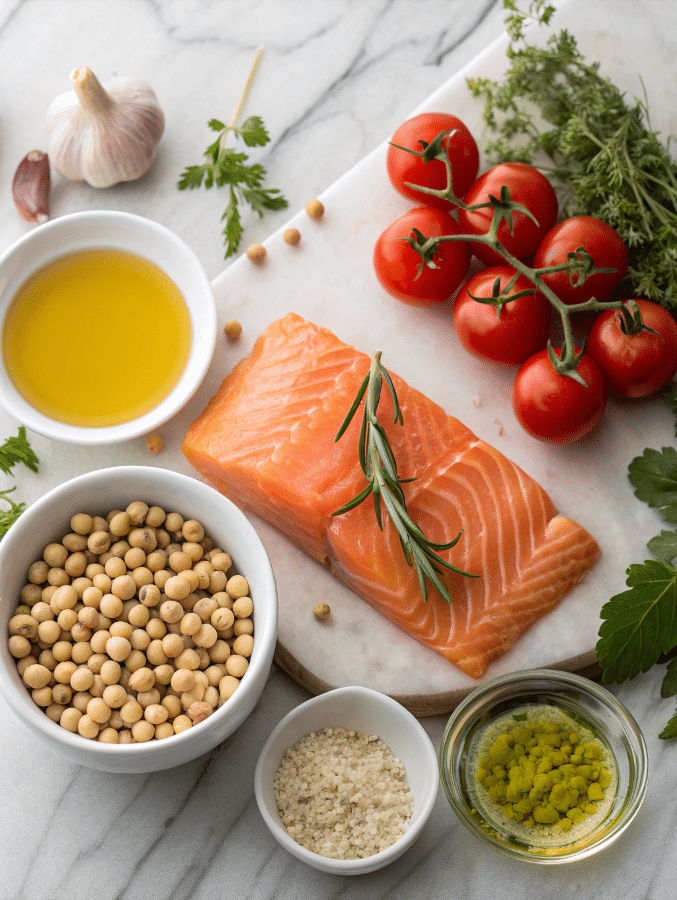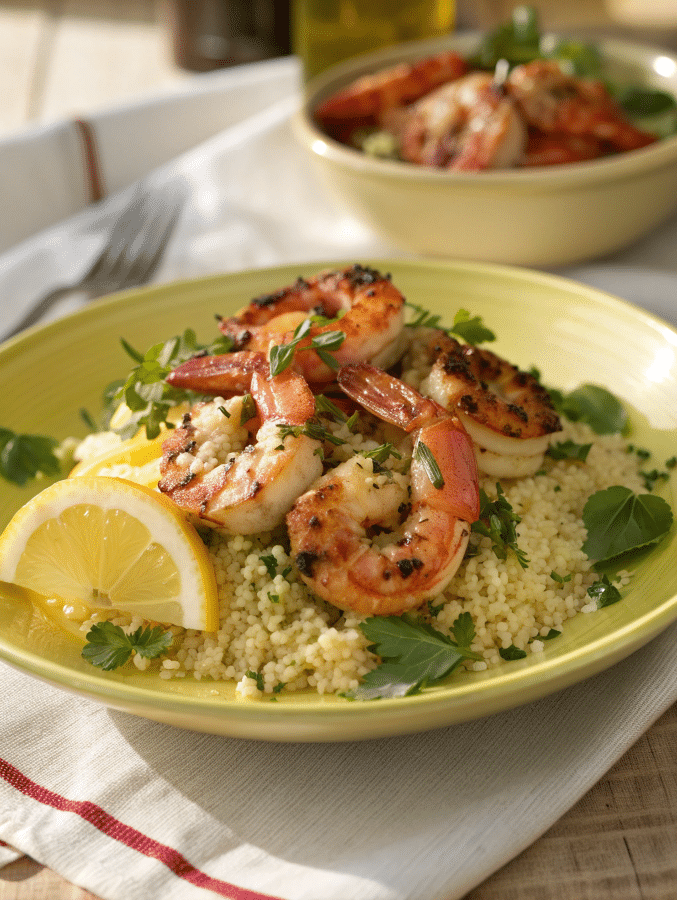
Looking for a Mediterranean diet meal plan that’s simple, flavorful, and realistic? You’re in the right place. This authentic Mediterranean diet meal plan offers more than just a guide, it’s a lifestyle rooted in fresh, wholesome foods. Whether you’re after a sample Mediterranean diet meal plan, a full Mediterranean diet menu, or new Mediterranean diet ideas meal plan to try this week, we’ve got you covered. This article provides a practical sample of Mediterranean diet eating, including a complete Mediterranean diet menu plan to help you get started with a flexible and nourishing Mediterranean diet plan.
In this Article
Key Takeaways:
- A Mediterranean diet meal plan focuses on whole, unprocessed foods
- Includes lean proteins, healthy fats, and vibrant produce
- Backed by science for heart and brain health
- Flexible for beginners, with anti-inflammatory benefits
- Delicious, easy to follow, and sustainable
Foundations of the Mediterranean Diet Meal Plan
Eating with Purpose: What Makes It Mediterranean
At its core, a Mediterranean diet meal plan is built around foods commonly eaten in coastal countries like Greece, Italy, and Spain. It emphasizes plant-based meals, healthy fats, and moderate portions of lean protein. The real beauty of it? There’s no rigid “do this, not that” rulebook. Instead, the focus is on building meals around:
- Vegetables and fruits (at least 5 servings/day)
- Whole grains like farro, bulgur, and brown rice
- Legumes such as lentils, chickpeas, and white beans
- Healthy fats, especially extra virgin olive oil
- Seafood like salmon, sardines, and trout
- Herbs and spices instead of heavy salt
- Moderate wine (mostly red)
- Limited red meats and sweets
These foods come together to create meals that are anti-inflammatory, heart-healthy, and deeply flavorful. For example, you might enjoy a lunch of grilled vegetables with hummus and whole grain pita, followed by fresh fruit or a few almonds.
You can see this balanced approach reflected in our breakdown of Mediterranean diet essentials, where real, minimally processed ingredients take center stage.
According to Nutrition.gov, this eating pattern has been shown to support cardiovascular health and reduce chronic disease risk.
Why It Works: Science-Backed and Sustainable
The Mediterranean diet isn’t just trendy, it’s one of the most researched and FDA-supported eating patterns in the world. According to studies summarized by Wikipedia, it’s linked to:
- Lower blood pressure and cholesterol
- Reduced risk of heart attack and stroke
- Improved brain function and memory
- Better weight management
Because it’s focused on what you can enjoy, not restrictions, it’s easier to follow than most diets. You’ll still enjoy delicious meals, like pink salt–seasoned roasted vegetables or hearty lentil stews, that fill you up and fuel your body.
What makes it even more doable? No weird ingredients or hard-to-follow recipes. Whether you’re prepping with Celtic salt for flavor or drizzling tahini over roasted eggplant, you’re always just a few steps away from something nourishing.
The Mediterranean diet menu plan is more than a trend, it’s a sustainable way of eating inspired by the traditional cuisines of coastal countries like Greece and Italy. A well-balanced sample Mediterranean diet meal plan includes a variety of fresh vegetables, lean proteins, whole grains, and healthy fats like olive oil and nuts. Whether you’re just beginning with a Mediterranean diet plan or looking to rotate in some new dishes from a sample Mediterranean diet menu, the goal is simplicity and nourishment. This guide offers an authentic Mediterranean diet meal plan filled with practical ideas to support long-term wellness.
A 7-Day Mediterranean Diet Meal Plan for Beginners

Build Your Week Around the Mediterranean Diet Meal Plan
A well-balanced Mediterranean diet meal plan isn’t about perfection, it’s about daily consistency and flavorful choices. By using real ingredients and strategic combinations, you can enjoy meals that are simple to prep, satisfying, and aligned with long-term wellness.
To help you get started, here’s a 7-day Mediterranean diet meal plan packed with variety, color, and nutrients. This plan highlights seasonal produce, plant-based proteins, and healthy fats while reducing refined sugars and saturated fats. It’s designed to help you feel full and energized without counting calories.
| Day | Meals |
|---|---|
| Monday | Avocado toast on whole-grain bread, lentil salad, baked salmon with farro and greens |
| Tuesday | Greek yogurt with berries, quinoa tabbouleh, grilled chicken with roasted eggplant |
| Wednesday | Chia pudding, chickpea-stuffed pita, Mediterranean veggie bowl with tahini dressing |
| Thursday | Hard-boiled eggs and fruit, tomato cucumber salad, grilled shrimp with brown rice and lemon vinaigrette |
| Friday | Smoothie with spinach and banana, hummus wrap, lentil stew with kale and olive oil |
| Saturday | Oatmeal with walnuts and figs, falafel with tahini, grilled sea bass with sautéed spinach |
| Sunday | Whole grain pancakes with fruit, spinach omelet, roasted chicken with root vegetables and herbs |
You can mix and match meals from this Mediterranean diet meal plan based on your preferences or seasonal availability. For beginners, start with 2–3 Mediterranean-style meals per day, then transition into full days over time.
To flavor your meals naturally, many people use ingredients like pink Himalayan salt or Celtic salt in moderation, which fit well into Mediterranean cooking when balanced with herbs and spices.
What to Drink in the Morning on a Mediterranean Diet
Mornings on a Mediterranean diet start with hydration and gentle nourishment. Unlike sugary cereals or processed drinks, a Mediterranean diet meal plan begins with clean, purposeful choices.
Here are a few healthy morning drink options:
- Warm lemon water: gently detoxifying and hydrating
- Black coffee or espresso: antioxidant-rich and traditional in many Mediterranean regions
- Green tea or herbal tea: soothing and naturally anti-inflammatory
- Fresh-squeezed juice: such as orange or pomegranate, in small portions
You can learn more about how real ingredients like pink salt support hydration and morning energy when used in balance with clean liquids. A pinch of mineral-rich salt in lemon water is popular for those transitioning to whole food diets like this one.
Drinks are an underrated part of your Mediterranean diet meal plan, they set your tone for the day. Choose beverages that nourish and replenish instead of spiking blood sugar or causing dehydration.
What to Avoid and What to Include in Your Mediterranean Diet Meal Plan
Foods to Avoid on a Mediterranean Diet Meal Plan
A true Mediterranean diet meal plan isn’t just about what you eat, it’s also about what you intentionally limit. The key lies in choosing nutrient-rich, whole foods while steering away from items that promote inflammation or spike blood sugar.
Here’s a breakdown of foods to avoid:
- Refined grains: white bread, white rice, and pasta made with enriched flour
- Added sugars: soda, candy, and desserts made with high-fructose corn syrup
- Processed meats: sausages, bacon, and deli meats high in nitrates
- Trans fats & refined oils: found in fast food and packaged snacks
- Artificial sweeteners and preservatives
These foods don’t align with a Mediterranean diet meal plan because they work against the balance and anti-inflammatory benefits that define this eating style. Instead, focus on foods that support gut health and heart health, like the ones included in our sample pink salt diet recipes, which often pair perfectly with Mediterranean flavors.
A useful trick? Whenever you’re unsure if something fits your plan, ask: “Could this food grow near the Mediterranean coast?” If not, it probably doesn’t belong in your Mediterranean diet meal plan.
For clarity, even some “gray area” foods are best eaten sparingly, like white potatoes. Although not banned, they’re high-glycemic and often prepared in unhealthy ways. You’ll find better starchy options in legumes, sweet potatoes, or whole grains.
We explore smart swaps in recipes like our Japanese pink salt and ice combination, which promote hydration and clean eating without unnecessary fillers.
What’s Allowed? The Mediterranean Diet Food List for Beginners
If you’re new to this way of eating, having a beginner-focused food list is a game-changer. The Mediterranean diet meal plan thrives on fresh, seasonal ingredients, but here’s a core list to get you started:
Proteins
- Fatty fish: salmon, sardines, mackerel
- Poultry: chicken, turkey
- Eggs: Yes, eggs are absolutely allowed, boiled, scrambled in olive oil, or part of dishes like shakshuka
- Legumes: lentils, chickpeas, black beans
Grains
- Farro, bulgur, barley, brown rice, quinoa
- Whole-grain bread or pasta (minimally processed)
Vegetables & Fruits
- Leafy greens, bell peppers, tomatoes, cucumbers, zucchini
- Berries, citrus fruits, figs, grapes, apples
Fats & Dairy
- Extra virgin olive oil (your primary fat source)
- Avocados, nuts (almonds, walnuts), seeds
- Greek yogurt, small portions of feta or goat cheese
Extras
- Herbs: oregano, basil, mint, dill
- Spices: turmeric, cinnamon, cumin
- Wine: moderate red wine (optional)
This food list is your foundation. You can layer in nourishing choices from related dishes like our gelatin-based recipes or hydration-focused options that use naturally sourced salt. Both align beautifully with your evolving Mediterranean diet meal plan when used in balance.
Still unsure where to start? Our intro to the Mediterranean diet offers a deeper breakdown that pairs well with any weekly plan or grocery list.
Anti-Inflammatory Power & Health Benefits of a Mediterranean Diet Meal Plan

Is the Mediterranean Diet Meal Plan Anti-Inflammatory?
Absolutely, a Mediterranean diet meal plan is inherently anti-inflammatory. That’s one of the main reasons it’s been recommended for decades by heart health experts, longevity researchers, and registered dietitians alike.
What sets this eating pattern apart is its reliance on real, unprocessed ingredients packed with antioxidants, omega-3s, fiber, and phytonutrients. These nutrients help reduce inflammation at the cellular level, protecting your body against chronic diseases such as:
- Heart disease
- Type 2 diabetes
- Cognitive decline
- Autoimmune flare-ups
- Metabolic syndrome
Foods like extra virgin olive oil, salmon, leafy greens, lentils, and berries are pillars of a Mediterranean diet meal plan, and they all deliver anti-inflammatory properties backed by decades of clinical research.
If you’re transitioning into this way of eating, it’s smart to lean on recipes that support detoxification and gut health. For instance, options like pink salt lemon water and natural hydration tricks can complement your Mediterranean-style mornings. Just make sure you’re focusing on balance—pair hydration with fiber-rich foods, healthy fats, and colorful vegetables.
Long-Term Benefits of Following a Mediterranean Diet Meal Plan
The Mediterranean diet meal plan is far more than a quick fix. It’s a long-term lifestyle that’s been shown to extend life expectancy and reduce the risk of many chronic conditions.
According to research summarized by the National Institutes of Health, the Mediterranean diet has been linked to:
- Improved brain function and reduced risk of Alzheimer’s
- Lower risk of heart attack and stroke
- Improved insulin sensitivity and lower blood sugar levels
- Sustained weight management without calorie restriction
- Reduced belly fat and better hormonal balance
The beauty of a Mediterranean diet meal plan lies in its sustainability. Unlike fad diets that cut out entire food groups, this plan encourages enjoyment, social eating, and diversity in your meals. You can still enjoy hearty dishes, like roasted chicken with olive oil and herbs, or fresh meals like cucumber salads enhanced with pink salt that hydrate and satisfy without bloating or heaviness.
For people looking to reduce inflammation, lose weight, or simply feel more energized, a structured Mediterranean diet meal plan provides all the tools: flavorful recipes, flexible meals, and a science-backed path toward vibrant health.
FAQs About the Mediterranean Diet Meal Plan
What are the top 10 foods on a Mediterranean diet meal plan?
The best foods for a Mediterranean diet meal plan are those rich in antioxidants, fiber, and healthy fats. Here are the top 10 essentials:
Extra virgin olive oil
Fatty fish (like salmon and sardines)
Chickpeas and lentils
Leafy greens and fresh vegetables
Whole grains (farro, bulgur, quinoa)
Tomatoes
Garlic and onions
Greek yogurt
Fresh fruit (especially berries and citrus)
Nuts (especially almonds and walnuts)
These ingredients should form the foundation of any Mediterranean diet meal plan, offering versatility, nutrition, and flavor.
What foods can you not eat in a Mediterranean diet meal plan?
Your Mediterranean diet meal plan should exclude ultra-processed foods, including:
Sugary snacks and sodas
White bread and refined grains
Processed meats (like sausage or bacon)
Trans fats and hydrogenated oils
Artificial sweeteners and packaged snacks
Instead of these, build your meals with ingredients found in our Mediterranean-friendly natural pink salt recipes, which help maintain purity and balance in your meal planning.
Are eggs eaten in a Mediterranean diet meal plan?
Yes, eggs are welcome in a Mediterranean diet meal plan. They’re usually consumed in moderation, boiled, poached, or scrambled in olive oil. A traditional breakfast might include an egg with sautéed vegetables or folded into a frittata with spinach and herbs.
The flexibility of this diet allows you to enjoy eggs as part of a diverse weekly plan, perfect for protein without over-relying on red meat.
Is the Mediterranean diet meal plan anti-inflammatory?
Definitely. A well-structured Mediterranean diet meal plan reduces inflammation by supplying the body with healthy fats, fiber, and antioxidants. Key players like olive oil, leafy greens, oily fish, and turmeric actively combat inflammation at the cellular level.
Many recipes found on our site, including simple hydration-focused meals, naturally support anti-inflammatory effects when paired with Mediterranean staples.
What is an example of a Mediterranean diet meal plan?
A sample day from a Mediterranean diet meal plan might look like this:
Breakfast: Greek yogurt with walnuts and figs
Lunch: Quinoa salad with cucumbers, chickpeas, and lemon
Dinner: Grilled sea bass with roasted zucchini and tomato
Snacks: Fresh fruit, almonds, or a boiled egg
This type of Mediterranean diet meal plan keeps you satisfied, energized, and focused without counting calories or sacrificing taste. See our full 7-day plan in Part 2 for more options.
Are potatoes allowed in a Mediterranean diet meal plan?
White potatoes aren’t forbidden, but they’re not ideal in a Mediterranean diet meal plan. Sweet potatoes or legumes make better choices due to their lower glycemic index. If you do include potatoes, aim for roasted or boiled versions seasoned with heart-healthy fats and herbs, not fried.
What is the Mediterranean diet food list for beginners?
The best beginner-friendly Mediterranean diet meal plan includes:
Veggies: spinach, bell peppers, tomatoes
Grains: bulgur, barley, brown rice
Proteins: fish, beans, eggs, poultry
Fats: olive oil, nuts, seeds
Extras: herbs, garlic, lemon
Pairing these with ingredients from our pink salt-enhanced recipes can elevate both flavor and nutrition.
What do I drink in the morning on a Mediterranean diet meal plan?
Start your day with simple, nourishing drinks:
Warm lemon water
Herbal tea
Black coffee or espresso
Fresh fruit juice in moderation
Hydration plays a critical role in a successful Mediterranean diet meal plan. Learn how balanced mineral intake like Celtic salt can help support energy levels naturally.
Conclusion: A Mediterranean Diet Meal Plan is the Key to Lifelong Wellness
Following a Mediterranean diet meal plan is more than just a smart nutritional choice, it’s a lifestyle shift that encourages mindful eating, balance, and long-term health. Unlike restrictive diets, the Mediterranean way celebrates flavor, variety, and satisfaction.
It’s not about perfection; it’s about consistency. You don’t need to give up carbs, count calories, or eat bland meals. With the Mediterranean approach, you’ll fill your plate with vibrant vegetables, hearty grains, lean proteins, and healthy fats that fuel your body and support your well-being.
One of the best parts? This lifestyle is fully adaptable to modern kitchens. Whether you’re cooking with seasonal produce, experimenting with pink salt-based hydration recipes, or keeping it simple with olive oil and herbs, a Mediterranean diet meal plan fits effortlessly into your daily routine.
If you’re ready to build your own routine, this complete Mediterranean diet meal plan guide from Deen Recipes offers excellent visual examples and structured plans to help you stay on track with ease and flavor. It’s a practical companion for everything we’ve covered here.
So grab your cutting board, stock up on whole foods, and let your kitchen become the heart of your health journey. Your Mediterranean lifestyle starts now, and it’s one you’ll actually enjoy living.



